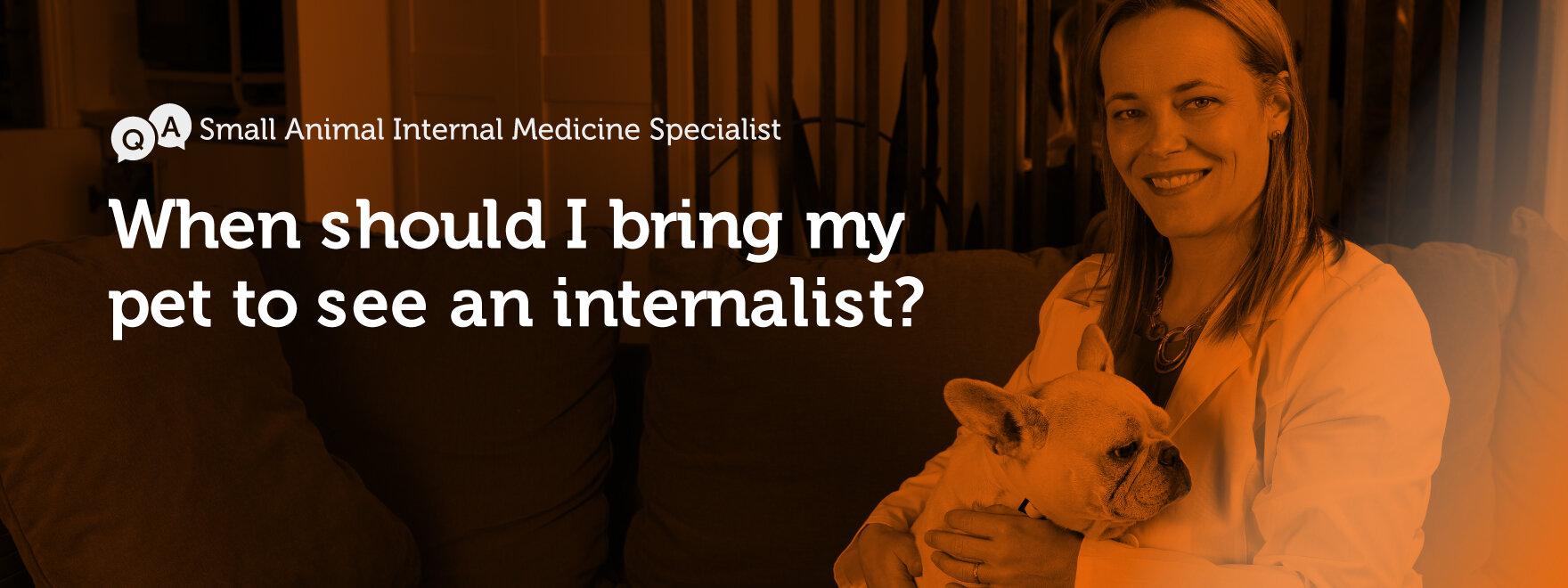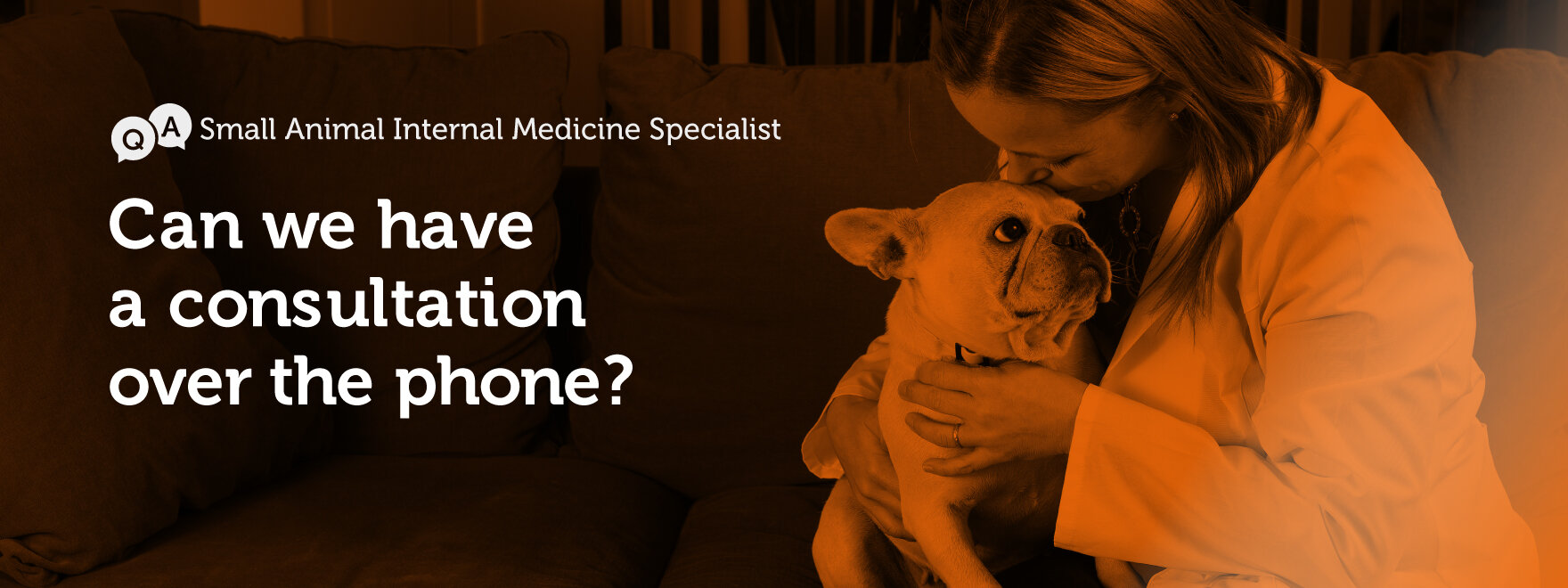Q&A - Small Animal Internal Medicine Specialist
What is a Small Animal Internal Medicine specialist?
We are the geeks of the veterinary world. We have been described as the puzzle solvers, the diagnosticians of the veterinary world. When we want to be cool, we describe ourselves as similar to House on TV (hopefully without the awful personality). We look at the body as a whole (not just one organ, such as the eye) and come up with a good story to explain everything that is going on. We deal with everything except external medicine – if you can’t see it when you look at your pet, we deal with it. We shouldn’t be allowed anywhere near a surgical suite – we prefer our dark rooms doing ultrasounds and endoscopy. We also serve as the captain of the veterinary team, incorporating many different specialists and veterinarian to come up with the best plan for your pet.
What kind of disease do you deal with?
We deal with anything from immune mediated, kidney, urinary, and GI diseases to cancer, endocrine disorders and fungal, and nasal diseases.
When should I bring my pet to see an internalist?
Your general practitioner (the vet who sees your pet yearly and administers vaccines) will guide you as to when you should see an internist. You will usually be referred to an internalist when you need advanced diagnostics that your general practitioner doesn’t provide (such as ultrasound or endoscopy), or a disease has been found that requires intensive treatment. I believe that it is always your right to seek a second opinion, and that should be encouraged by every vet you see.
What should I expect from my first visit to an internalist?
Hopefully, your pet’s medical records will have been sent to the internist prior to your appointment. If so, I always prepare our first appointment by reading over the records. I will then meet with you, introduce myself, and discuss the clinical signs that YOU have been seeing at home. Be prepared for lots of detailed and open-ended questions!
As internists, I always want to know about timelines, to see what came first, etc. You may feel like you’re being grilled – don’t worry, there are no wrong answers here, I am trying to get as much information to help your pet in the best way possible. It’s okay to say that you don’t know- I prefer that to an inaccurate answer. I will then examine your pet, so make sure that you bring your pet to the appointment!
After that, together we will discuss the possible causes for the clinical signs reported and what testing I would recommend doing next. This may or may not be the same tests that you were sent in for (i.e., ultrasound).
We will go over the testing that is recommended, how much it will cost, will it hurt, etc. I will then borrow your pet to do the testing. Together, we will go over the test results as soon as we have them. This may be the same day (ultrasound, X-rays, some blood work done in-house), or a few days later. We will then come up with a treatment plan and/or plan for further diagnostics. Please do not be discouraged or frustrated if you do not have all the answers at the end of your appointment.
Medicine is an art, not a science. There is no perfect test that guarantees an answer every time. The testing that we perform is used to look for our most likely diagnosis and rule in or out specific diseases.
How can I ensure that my visit runs smoothly?
Be on time, or even 15 minutes early! We will contact your general practitioner for all the medical records prior to your visit.
Before your appointment, make sure that you give us the names of all veterinary practices who have treated your pet, including other specialists and emergency departments. Make sure that all of your pet’s X-rays and medical records are also sent to us.
Make a list of all the medications and dosages your pet is taking (including over the counter medications and supplements), as well as type and amount of food they eat. If the person responsible for the pet is not able to come to the visit, I prefer that they be present via phone during the consultation, so that I can go over everything with everyone at once.
Why is veterinary speciality care so expensive?
You are paying for our expertise and time. Also, the equipment that we use in veterinary medicine is the same equipment that is used in human medicine.
Not only is it expensive to buy and maintain this equipment, but so is running and maintaining a 24/7 speciality hospital. As veterinarians, we love your pets and want to help them, but we can’t do it for free.
The best advice I can give you is to buy pet insurance when your pet is young. If you wait to buy pet insurance after they are sick, their illness will most likely be excluded as a pre-existing condition.
Why can’t I be present while my pet is having tests performed?
The simple answer is that you don’t want to be. I don’t want your pet to blame you for any of the tests we do. If your pet has to hate somebody for holding them still, I would rather it be us.
Also, we legally cannot have you hold your dog for testing, because our insurance does not cover you if you get bitten or hurt. Even the nicest dog can bite in a stressful situation.
A third reason is that I have no poker face. If you are in the room, I may tell you something scary only to have to rescind it when I have more information. I would rather tell you the final results all at once, rather than giving you mini-heart attacks throughout the day.
Can we have a consultation over the phone?
No, it’s illegal to dispense medication or veterinary advice without a valid client-patient-veterinary relationship.
Establishing a veterinary-patient relationship requires that I have seen and examined your pet. Holding them up to the phone is not sufficient. Once I have seen your pet, we can sometimes do follow up consultations over the phone in terms of medication changes and monitoring.
Dr Lawren’s Approach
Bringing in your pets for treatment can be stressful and worrying. That’s why I always work alongside pet-owners, through educating them and their families, to determine the best course of action.
I always prefer a team-orientated approach, including specialists, general practitioners, and the pet’s family, to ensure that the best care is provided for your pet.
As a Small Animal Internal Medicine Specialist, I specialise in long-term management of multiple chronic illnesses, and endocrine disorders such as diabetes and Cushing’s Disease. I also specialise in veterinary palliative and hospice care, and am a certified Fear Free Practitioner.








